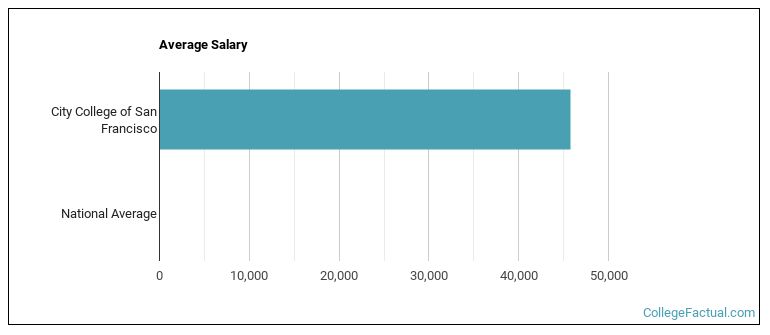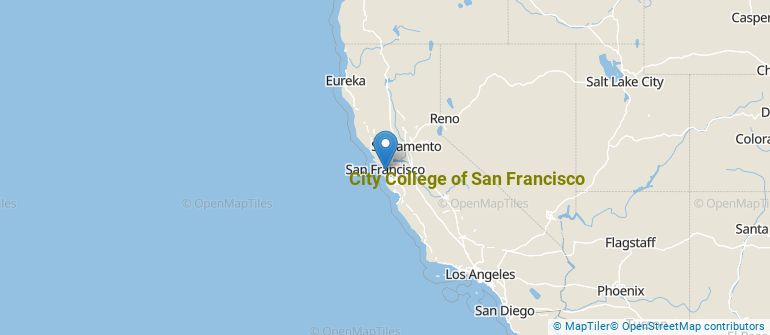 by our College Data Analytics Team
by our College Data Analytics Team
College Factual analyzes over 2,000 colleges and universities in its annual rankings and ranks them in a variety of ways, including most diverse, best overall quality, best for non-traditional students, and much more.
City College of San Francisco was awarded 38 badges in the 2025 rankings. The highest ranked major at the school is allied health professions.
Explore the best ranked schools for the programs you are most interested in.
According to College Factual's 2025 analysis, City College of San Francisco is ranked #228 out of 2,152 schools in the nation that were analyzed for overall quality. This puts it in the top 20% of all schools in the nation. This is an improvement over the previous year, when City College of San Francisco held the #750 spot on the Best Overall Colleges list.
City College of San Francisco also holds the #31 spot on the Best Colleges in California ranking.
City College of San Francisco has an open admissions policy, so you should not have much trouble being accepted by the school. Still, it is important to fill out the application completely and submit any requested materials, which may include proof that you have a high school diploma or the equivalent.
The student to faculty ratio is often used as a measure to gauge how much access students will have to their professors - the lower the number, the better. At City College of San Francisco, this rate is 20 to 1, which is high when compared to the national average of 15 to 1.
Another measure that is often used to estimate how much access students will have to their professors is how many faculty members are full-time. The idea here is that part-time faculty tend to spend less time on campus, so they may not be as available to students as full-timers.
The full-time faculty percentage at City College of San Francisco is 50%. This is comparable to the national average of 47%.
The freshmen retention rate tells us what percentage of first-year, full-time students choose to continue on to their sophomore year at a particular school. The rate at City College of San Francisco is 67%, which is about average when compared to the national rate of 68%.
During the 2017-2018 academic year, there were 19,707 undergraduates at City College of San Francisco with 6,737 being full-time and 12,970 being part-time.
| $0-30 K | $30K-48K | $48-75 | $75-110K | $110K + |
|---|---|---|---|---|
| $5,664 | $7,112 | $8,778 | $10,224 | $8,181 |
The net price is calculated by adding tuition, room, board and other costs and subtracting financial aid.Note that the net price is typically less than the published for a school. For more information on the sticker price of City College of San Francisco, see our tuition and fees and room and board pages.
It's not uncommon for college students to take out loans to pay for school. In fact, almost 66% of students nationwide depend at least partially on loans. At City College of San Francisco, approximately 1% of students took out student loans averaging $9,402 a year. That adds up to $37,608 over four years for those students.
Get more details about paying for City College of San Francisco.

See which majors at City College of San Francisco make the most money.
Get more details about the location of City College of San Francisco.

Contact details for City College of San Francisco are given below.
| Contact Details | |
|---|---|
| Address: | 50 Frida Kahlo Drive, San Francisco, CA 94112-1898 |
| Phone: | 415-239-3000 |
| Website: | www.ccsf.edu/ |
| Most Popular Majors | Bachelor’s Degrees | Average Salary of Graduates |
|---|---|---|
| Liberal Arts General Studies | 877 | NA |
| Human Development & Family Studies | 506 | NA |
| Biological & Physical Science | 222 | NA |
| Business Administration & Management | 220 | NA |
| General Biology | 185 | NA |
| Computer Systems Networking | 181 | NA |
| Allied Health Professions | 110 | NA |
| Biological & Biomedical Sciences (Other) | 93 | NA |
| Fire Protection | 93 | NA |
| Computer Software & Applications | 90 | NA |
Online learning is becoming popular at even the oldest colleges and universities in the United States. Not only are online classes great for returning adults with busy schedules, they are also frequented by a growing number of traditional students.
In 2022-2023, 8,096 students took at least one online class at City College of San Francisco. This is an increase from the 7,714 students who took online classes the previous year.
| Year | Took at Least One Online Class | Took All Classes Online |
|---|---|---|
| 2022-2023 | 8,096 | 3,434 |
| 2021-2022 | 7,714 | 2,277 |
| 2020-2021 | 6,833 | 1,958 |
| 2018-2019 | 5,806 | 2,062 |
Learn more about online learning at City College of San Francisco.
Footnotes
*The racial-ethnic minorities count is calculated by taking the total number of students and subtracting white students, international students, and students whose race/ethnicity was unknown. This number is then divided by the total number of students at the school to obtain the racial-ethnic minorities percentage.
References
More about our data sources and methodologies.